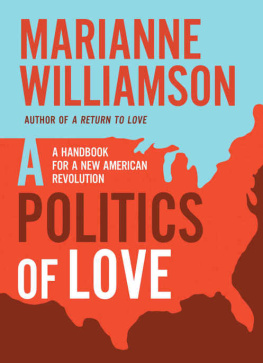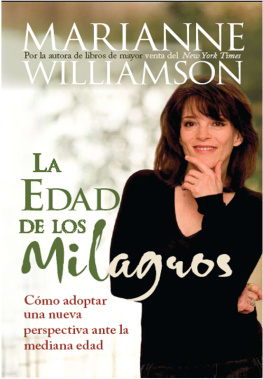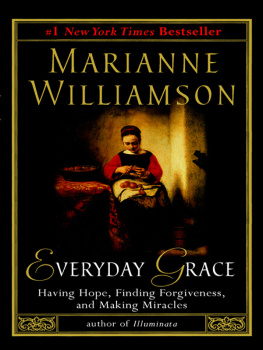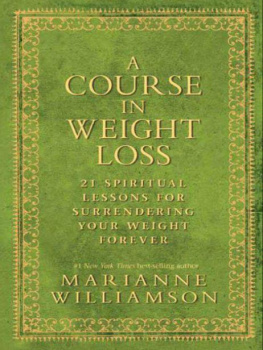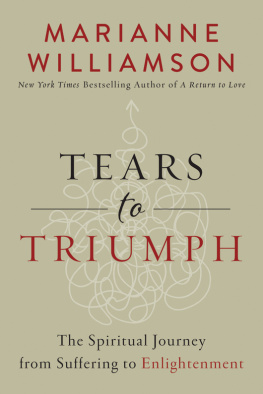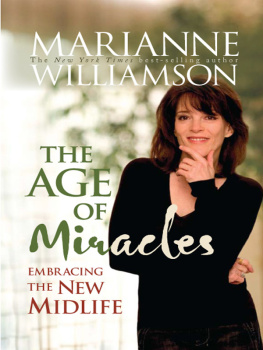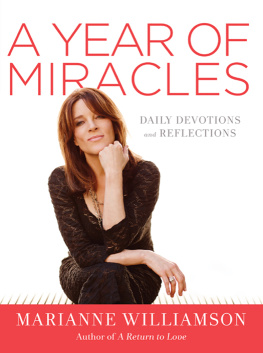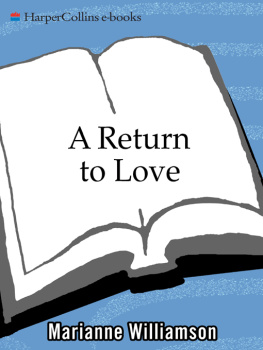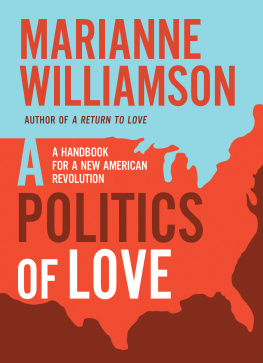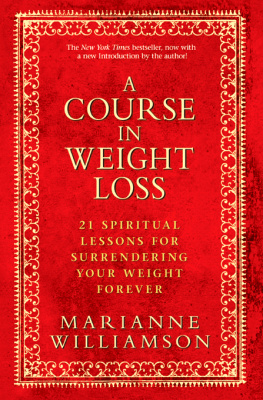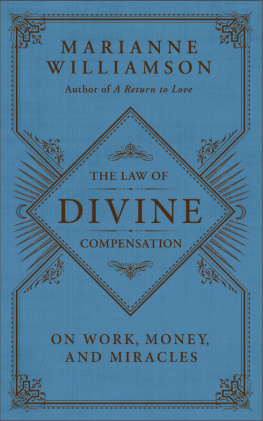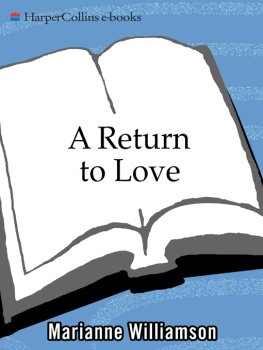Marianne Williamson - A Politics of Love
Here you can read online Marianne Williamson - A Politics of Love full text of the book (entire story) in english for free. Download pdf and epub, get meaning, cover and reviews about this ebook. year: 2019, genre: Politics. Description of the work, (preface) as well as reviews are available. Best literature library LitArk.com created for fans of good reading and offers a wide selection of genres:
Romance novel
Science fiction
Adventure
Detective
Science
History
Home and family
Prose
Art
Politics
Computer
Non-fiction
Religion
Business
Children
Humor
Choose a favorite category and find really read worthwhile books. Enjoy immersion in the world of imagination, feel the emotions of the characters or learn something new for yourself, make an fascinating discovery.
- Book:A Politics of Love
- Author:
- Genre:
- Year:2019
- Rating:4 / 5
- Favourites:Add to favourites
- Your mark:
- 80
- 1
- 2
- 3
- 4
- 5
A Politics of Love: summary, description and annotation
We offer to read an annotation, description, summary or preface (depends on what the author of the book "A Politics of Love" wrote himself). If you haven't found the necessary information about the book — write in the comments, we will try to find it.
A Politics of Love — read online for free the complete book (whole text) full work
Below is the text of the book, divided by pages. System saving the place of the last page read, allows you to conveniently read the book "A Politics of Love" online for free, without having to search again every time where you left off. Put a bookmark, and you can go to the page where you finished reading at any time.
Font size:
Interval:
Bookmark:
For those who came before,
and those who will come after
I began lecturing on A Course in Miracles, a book of spiritual psychology, in 1983. I was thirty-one years old.
I was thrilled to have the opportunity to do what I loved: talking to others about the themes in a book that had made such a difference in my life. But I had no idea I was doing something that would become a career path. I simply thought I was talking about A Course in Miracles because it brought me joy to do it.
Then something happened. I was living in Los Angeles, and as anyone who was around at the time can testify, there began to be all this talk about a new, mysterious, very scary disease that was spreading. No one knew much about it except that it was deadly and communicable, mainly gay men were getting it, and there was no known cure. To contract it was an automatic death sentence. The disease was called AIDS.
I had been lecturing mainly to a small group of people at the Philosophical Research Society in the Los Feliz area, and suddenly my lecture audiences began to grow. We went from a small room on Saturday mornings to the auditorium on Tuesday nights, then from the auditorium on Tuesday nights to a church in Hollywood on both Tuesday nights and Saturday mornings. We continued to need more space. Gay men in Los Angelessuddenly terrifiedwere looking for miracles, and with good reason.
Day after day, guests at someones party turned into attendees at someones funeral. Western medicine played various cards, but it was clearly stymied. In the early days of the epidemic it had nothing to offer, and organized religious institutions at the time were oddly quiet. One can see why a young woman talking about miracles, and about a God who loved everyone no matter what, was just the ticket for many. Most of my audience was young, and at the time I was too. None of us knew what had hit us, but my faith in miracles was strong and I was glad to share it.
Unless youve been in a war zone, you cant truly understand what those days were like. Friends and loved ones were dying all around us. Once people were diagnosed, there was apparently no hope for survival. People were young and gorgeous one day, then covered with horrible sores, blind, and walking with a cane the next. Many had to deal with the harrowing experience of revealing to their parents that they were gay and that they were dying. There was no room, and no time, for anything but being present to the moment, making every effort to survive. This wasnt the fun and fabulous eighties anymore. For many, life was lived on a razors edge between life and death.
Everyone I knew was dealing with the disease, either directly because they had been diagnosed or indirectly because of friends or family who were. You were emotionally exposed to the epidemic simply by living in LA. The creative ranks of Hollywood contained a large gay population, and the entertainment community was hugely compassionate toward those who suffered. More and more people were being diagnosed who were not gay as well, having gotten the disease from blood transfusions, shared needles, or even one-night stands. The experience was overwhelming. To be alive at that time and in the presence of that disease was to be heartbrokenbut it was also to be transformed. There is something about being around death that makes life more obviously precious.
Whatever shallow preoccupations might have meant something before meant nothing to us now. Superficial concerns simply melted away, except when needed as an escape valve. The goal was survival, by whatever means and for however long possible. And everyone was grasping for hope. I remember saying over and over, at lecture after lecture and support group after support group, There doesnt have to be a cure for AIDS for it to become a chronic, manageable condition. There isnt a cure for diabetes, but its a manageable condition! We survived on that hope, articulating it over and over with tears in our eyes. I marvel at the fact that AIDS has now become, for many people, exactly that.
What I remember most from those days, however, is not the pain but the love.
I remember the people, both those who passed and those who remain. And like everyone who lived through that time, I remember so many stories. There was one young man named Merle, slightly built and shy, not the Hollywood type at all, who used to volunteer selling books at my lectures. As he grew ill, his fatherbuilt not at all like his son but more like a football quarterbackbegan helping him carry boxes of books to my lectures every Saturday morning. Merles father was clearly unaccustomed to the world of gay Hollywood, and was at the very least in denial about his sons homosexuality. He sat at my lectures surveying the scene every Saturday, seeming to gradually awaken to what was happening around him. I would often watch him, so clearly flummoxed, so clearly heartbroken, as he did everything he could to help Merle continue an activity that gave meaning and purpose to his life.
Some today might find it hard to understand just how devastating it was for a young man at the time to be forced to deal not only with the disease, but with the fact that his parents didnt even know he was gay. Some expressed greater anxiety about saying, Mom and Dad, Im gay, than about saying, Mom and Dad, Im dying. Merles father was someone for whom the idea of homosexuality was clearly foreign, but AIDS burst that closet door open for millions. Merles father loved his son, and stood by him every step of the way; he also came to realize all the other gay men who were there for him too. And how that man transformed. On the day Merle died, both he and his father were surrounded by a community of gay men.
That story is one of millions of memories, not only mine but those of many others who were affected by the scourge of AIDS. I look back on that era now as having been a deep initiation, not just individually but collectively. Fear was there, horror was there, suffering was there. But love was there too.
Love was there in the people who were dying, and in the people who were there to try to help them die peacefully. Love was there in the support groups we held, the nonprofits we established, the arms with which we held each other, the hospitals where we visited each other, the acceptance with which we faced the death of so many, and the endless tears we cried and which Im crying now as I write this.
I learned from that experience what tragedy looks like. But I also learned how beautiful people can be. To have learned those things on the level I learned them then is to know them in a way I could never forget. Whenever I meet someone I knew then, I feel a bond. We share something that did not go away when that period ended, something that would mark all of us forever. We lived through a crisis, yes. But in surviving it, we learned something very important: not only that crises pass, but that love is what gets us through them.
I have borne witness to many other crises since that time, both in my own life and in the lives of others. Ive lived long enough to know, both personally and professionally, that there are seasons of life. As my father used to say, you take the good with the bad. From divorce and painful breakups to the deaths of loved ones to surviving abuse to professional and financial failures to serious illnessthere are many ways that a life can fall, many variations of grief, and many forms that devastation can take. But one thing that makes suffering bearable is love. Love not only makes a crisis endurable; it makes it transformable. For where there is love, miracles happen. Love changes people, and when people are changed we change the world around us.
Font size:
Interval:
Bookmark:
Similar books «A Politics of Love»
Look at similar books to A Politics of Love. We have selected literature similar in name and meaning in the hope of providing readers with more options to find new, interesting, not yet read works.
Discussion, reviews of the book A Politics of Love and just readers' own opinions. Leave your comments, write what you think about the work, its meaning or the main characters. Specify what exactly you liked and what you didn't like, and why you think so.

